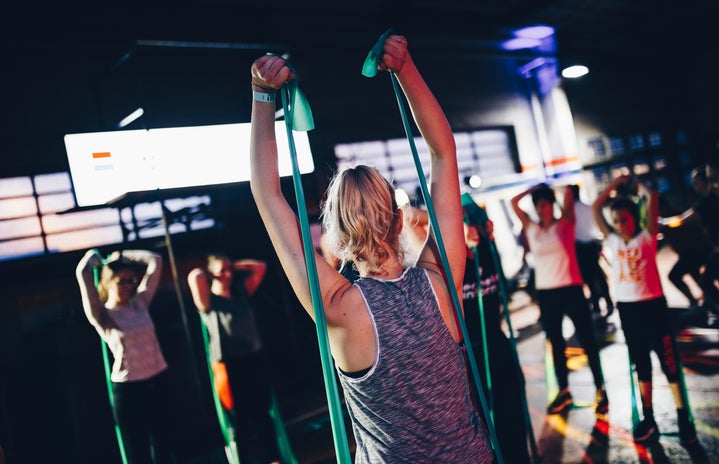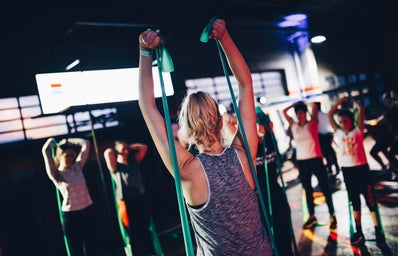Let’s talk about the KAC. Or, more specifically, what we do in the KAC. Whether you’re a warrior on the treadmill, an aspiring yogi, or the next Abby Wambach, one of the most important things to your athletic endeavours is what you’re putting in your body. Your body can do amazing things, but only when it’s being properly fueled. This first installation of Athletic Foodie is full of tips and tricks for maximizing your workout, along with a dispelled myth or two. I’m an art history and history major, not a doctor, so definitely talk to your coach, nutritionist, trainer, or doctor before you drastically change your eating habits.
Hydration is key.
This one seems kind of obvious, but it’s also the most important for anyone who’s working out, recreational and student-athlete alike. It’s pretty common knowledge that the human body is made up of roughly 70% water, so it makes sense that we need to replace the water we lose through sweat. We sweat all the time, whether we notice it or not, which is why it’s imperative to drink water throughout the day to stay hydrated. Ever felt sluggish after a night of drinking? That’s the dehydration talking. Now imagine trying to tackle a five mile run while feeling that sluggish—your body isn’t going to respond well to the stress of running, even if you’ve hit that mileage easily before. Dehydration prevents your body from performing at its peak and can actually be incredibly dangerous when workout conditions are really hot or your workout itself is really intense. Stay hydrated by carrying a water bottle around with you all day, avoiding drinks like soda, coffee, and tea in excess (they’re actually diuretics that facilitate dehydration), and eliminating alcohol on days where you’ll be working out.
Keep pre-workout meals light in the morning.
If you’re a morning person who likes to get to the KAC before the sun is up (or if your team has required morning workouts), you might be tempted to skip breakfast for that extra 10 minutes of sleep. Working out on an empty stomach is a bad idea, especially early in the morning when blood sugar levels are already lower than usual. You run the risk of passing out from overexertion and you definitely won’t have an effective workout if all you’re thinking about is how hungry you are.
On the flip side, you don’t need to eat a full breakfast before your workout, either. Something quick and small as you leave your room, like a banana, a granola bar, or a cup of yogurt, will be enough to sustain you while also allowing you those precious minutes of extra sleep and a maximized workout for the morning. You’ll get your blood sugar levels up and eliminate those hunger pains and stomach growls.
Carbs are energy…sort of.
I’m sure everyone has at least heard of “carbo-loading” the day of an intense workout or competition, but in case you haven’t, the idea is to eat a ton of carbs (pasta, bread, rice, etc.) the morning of for the energy that they give you. It’s an old practice and widely accepted as valid. While people aren’t wrong when they say that carbs are energy, carbo-loading may not be as effective as you would like to believe. Carbs are certainly energy, but they’re what dieticians and scientists consider quick-burning fuels. Your body uses them as the first source of fuel because they’re actually sugars, but also doesn’t reserve them during a workout, which can lead to a crash in a workout that lasts longer than an hour.
Sustained energy is produced from a consistent diet of proteins, carbs or grains, and natural sugars like fruits and vegetables. What you eat today will have an effect on how you feel during a workout tomorrow, which is why carbo-loading the day of a big workout might not be the most effective way to maximize your gains.
Listen to your body.
You could religiously follow a meal plan for workouts that’s perfectly balanced and ratioed for maximized workouts, but that’s no good if you’re not listening to your body. You know when something you eat doesn’t sit well with you and when something really jives with your workout for the day. Eat more before a workout if you find yourself getting hungry by the end of it and eat less if you start to cramp or feel sick. Like everything in life, what works for one person might not work for another, so don’t feel pinned down to a diet that your friend swears by.
You’ll also have different dietary needs based on what activity you’re doing and how intense it is. A swimmer may need more to eat before a workout than someone going in for a yoga session, while going for a light jog requires less meal preparation than going for a 5 mile timed run.
Listen to what your body is telling you—it’s pretty good at what it does. So fuel up and get out there for a good workout!
Image Credits: WiseGeek, ABCnews, Getty

